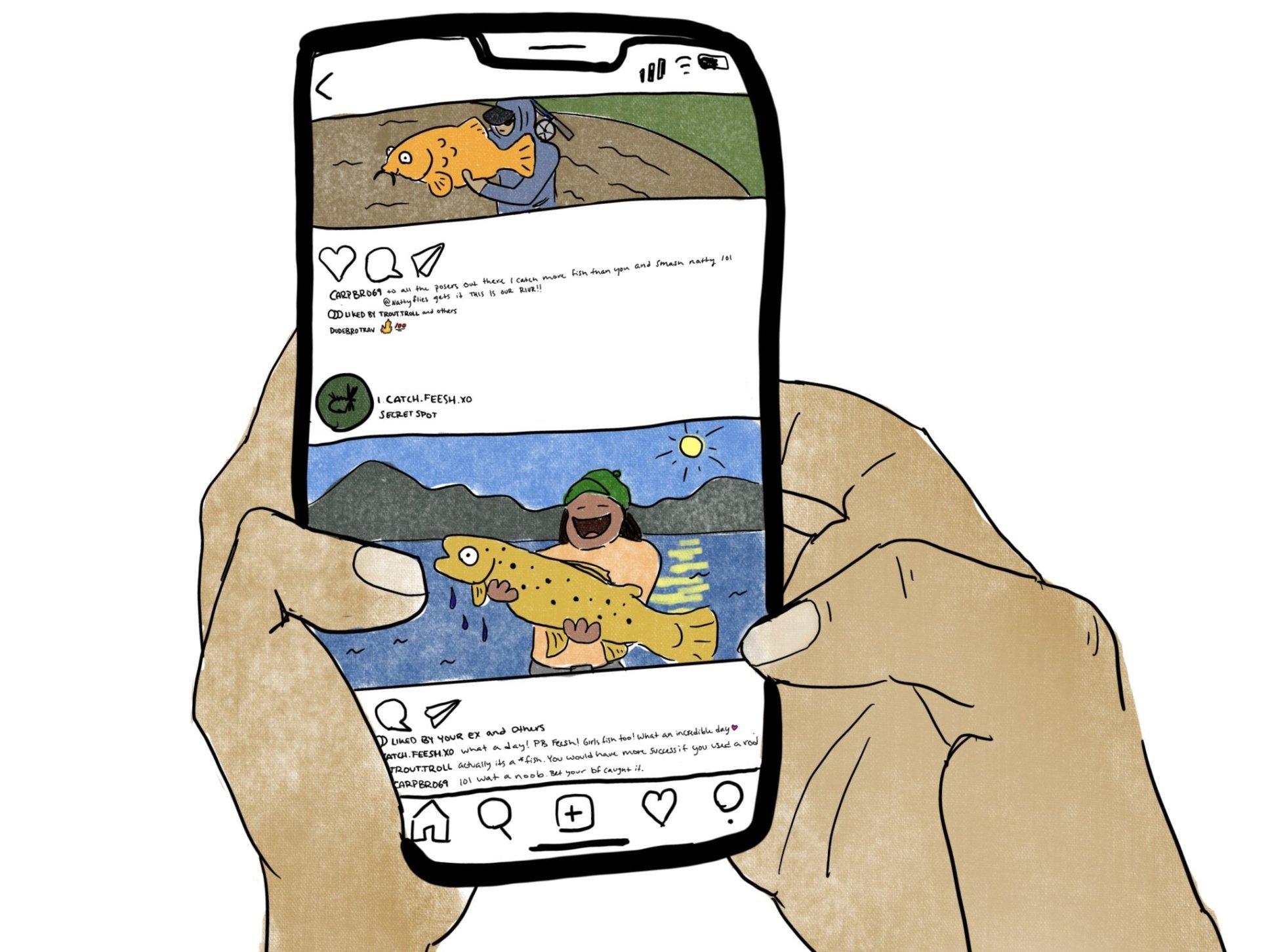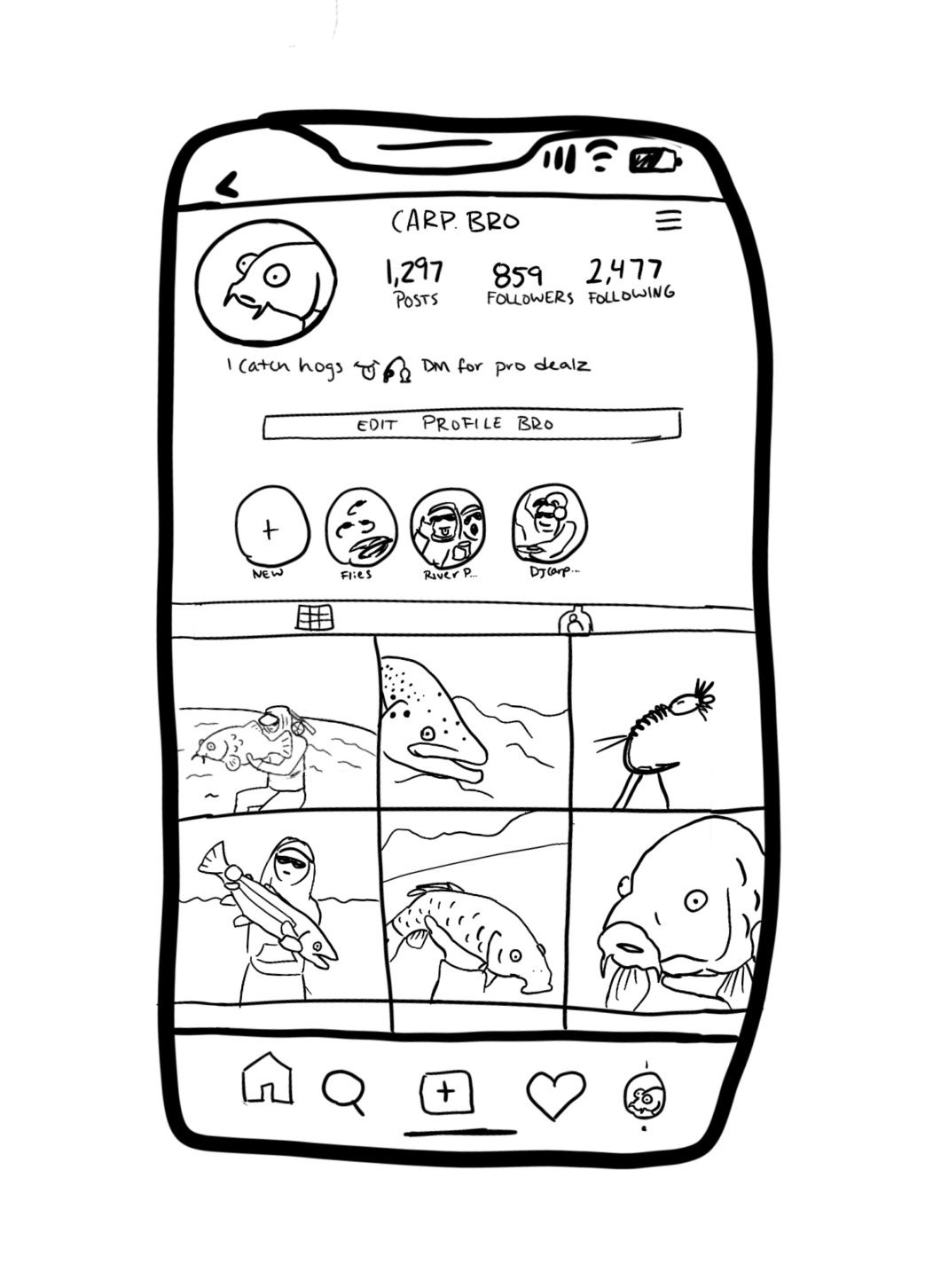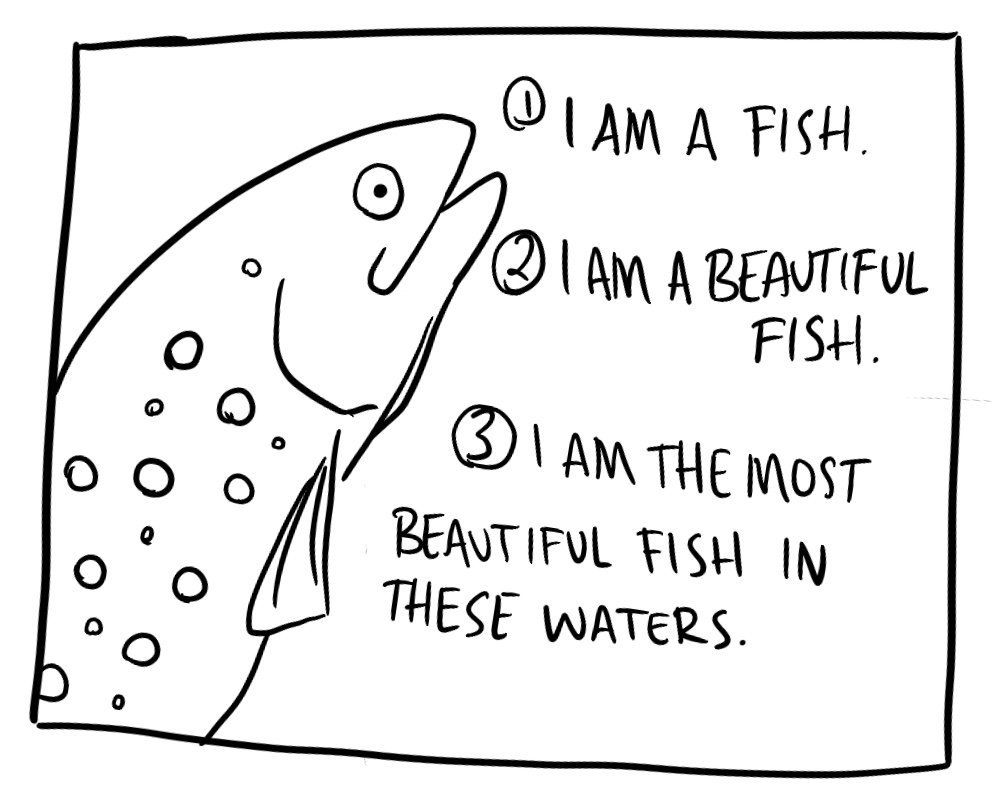Social Media Mindfulness: how to stop talking about each other and get back to fishing
As Confluence Collective moves into the new year, we’ve prioritized our presence in-person and on social media platforms over traditional blog commentary or newsletters. After all, hearing from one person in a one-sided form of communication is less in line with the kind of work we do, but more importantly: we interact with social platforms more regularly in fly fishing. Most of the time we think of it as a place to put some photos to stay in touch with friends, celebrate a good catch, or with nothing to post maybe just scroll. Social media is a space designed for our brains to be impulsive and spend more time scrolling, where it’s easy to test authenticity or alternative identity (felt cute), easy to leave our two cents either to engage in debate or walk away from without consequence (later trolls), and easy to show connection with someone (like, repost, comment) with our own commentary — negative or positive. They can be a space of tension between supportive community building at its best and destructive alienation at its worst.
Looking at a return to storytelling very intentionally on Instagram, we need to discuss practice and approach while remaining aware of the turbid nature of the medium. Mentions and reposts are commodified, intentions are filtered through different lenses along the way, or associated with the overarching aesthetic and brand of the mention we encounter. Somewhere on this shareable journey, the people can be lost — their stories are abridged, altered, and made to fit elsewhere. Or maybe we just really don’t get what they’re putting down. Regardless: lots of opportunity for misinterpretation and miscommunication. Let’s think about how to be better.
Reflective meaning-making process is one way to improve.
In self-reflective process, we take charge of ourselves, make sense of it, and then evaluate the world around us from our perspective while considering others. It’s essential to consider relationship of self to others, but with the distractions of social following it can become a trap of ONLY considering self to others, and cutting off the rest of the process. We’re encouraged to tell our story, share our take, define our selves and world; this, too, is inherent to American identity (liberty, independence, and unique identities pulling themselves up by bootstraps and all) but can be a crutch to avoid perspective shifting.
Perspective shifting is HARD. After all, we know we have feelings relating to others and they are there for a reason —but what about where those feelings come from? And what if the other side has other feelings, other perceptions? Difference isn’t entirely celebrated or understood…but it can be if we think through this process and work beyond the narrative of self to truly consider an external perspective before posting a comment or making a meme.
Perspective shifting becomes even harder when we don’t separate observations from judgments, which our brains automatically loop together: we want to use information we have to make the most of a situation in front of us, either surviving it, improving it, understanding it, etc. However, if we don’t recognize judgement as part of this process, our judgments just take over and color our understanding with abandon. In social media, this means we ignore the fact we don’t know a person, don’t know their situation, don’t know all the information. We let our emotions and past experiences feed into these judgments, reinforcing them internally before thinking about external validation; after all, we know our own past experiences so much better than the one at hand, and it can’t be that different, right? “Sure — comment!” says social media. We let these reference points reinforce us, so much so that we convince ourselves entitled to pass this judgement on easy communication formats like social media. Formats that minimize the person behind the account. Formats that have little consequence to yourself. Formats even hiding individual identity — literally, or behind a character we create — and allowing the guise of ‘humor’ to share commentary so when things fall flat/miss the mark, “satire” can be blamed instead of the human.
What happens when you break down observation from judgement instead of lumping them together? You get the opportunity to understand, even empathize, with someone different from you. It becomes about more than just you, your relation to something else, or your experiences dictating what your opinion is rather than forming it intentionally.
Let’s take a randomly selected statement from social media to explore this further — maintaining anonymity to avoid any bashing out of context, but to also share some commonly heard sentiments within fly fishing:
“I hear talk about sexism in fly fishing, but have yet to actually personally witness it. The only sexism I see is towards males. Why are we excluded from the women’s event? Sexism!” — self-identified male
We’re going to break this down by relying on a meaning-making process (a way to trick our brains before our brains trick us) where we differentiate observation from judgement, which is a hard thing to do since our brains have created shortcuts to improve efficiency:
OBSERVATION: what are the hard facts?
a man is questioning if a women’s-only event is beneficial.
JUDGEMENT: what do I think about the hard facts?
what’s this guy’s problem
EVALUATION: what could be going on here?
he did not receive an invite to the event and feels left out.
An added booby trap from our brains: when we don’t know or understand something, our brains like to suggest negative options for our evaluation. When I read this comment (in full context) my brain short-cut to this:
what an asshole, like he doesn’t already have enough access to cool fly fishing events. Women need these supportive community gatherings to deal with guys like you all the time — just leave us this!
Decidedly negative in terms of how I translated who this guy was. And see how I reverted to my own opinions/judgments on women in fly fishing? DEFINITELY informed by my past experiences and interactions, which ultimately isn’t fair to this person who, in a more positive evaluation, might be:
looking to better understand sexism (to then become an advocate, hooray!)
looking to help women’s events be successful by pointing out how some may appear exclusive, perpetuating an existing problem
maybe just feels left out and is putting emotions from a totally separate experience on this quick interaction instead of a tough confrontation with someone close
When you take the moment to think about more positive possibilities, chances are you can avoid a fire-fueled and exhausting confrontation and instead talk about fun core issues like how to be more understanding, how to make sense of complicated and systemic forms of oppression including but not limited to sexism, and how to work together to do better. For those who love humor, great: this helps you better understand people in general, which if an old standby like “there’s truth in every joke” remains accurate, you’ll be able to pack more “truth” in every joke. For those looking to make progress on social issues like sexism, this moment of pause means fewer conversations end with “agree to disagree” or “back in my day” — they become about the people present in dialogue, managing the interaction and talking about something rather than talking about each other, and probably learning something. And for all us fly fishers out there, it means we can actually get back to “just getting out there and having fun fishing” instead of arguing on social media. By taking this moment in process, you manage a (valid) emotional response to something your brain has you on the lookout for, and while you’ll hold these experiences as part of you, you can avoid projecting a past experience on a new one — at least until you work through the facts and acknowledge the other person involved as a person rather than a projection or persona. Who knows, you might end up with a new fishing buddy at the end of the exchange!
So while your brain does the important work of keeping you alive, speeding how you make sense of things, and making sure you learn from your experiences, sometimes it needs to be reminded that:
we don’t know everything
we still have so much to learn
just because something reminds you of something else doesn’t mean they’re the same
we can do so much better if we work together, even with people we may not have ever expected to know
After all, your brain is going to keep on doing this process with or without your input, so you might as well have some say in the matter. And in the end you can focus on the good parts of social media rather than perpetuating the bad ones.
In 2020, we’re using this reflective meaning-making process a lot in relation to women’s fly fishing groups. While these spaces have been hugely supportive for some new fly fishers, there are concerning exclusions perpetuated: we see a lot of the same demographics in these spaces, mostly being financially secure white women. If we want to truly address inclusivity in fly fishing, we need to look beyond the obvious need to support women on the water, and think about the ways we support each other as individuals — and specifically, who we don’t see in our women’s groups. That means we’re taking to social media all the more. We want to talk about repercussions to content, and ideally how to emphasize the supportive possibilities more often than not in our interactions on social media and more broadly within the fly fishing community. In order to do so, we’re going to share some of the lessons being learned by a handful of social media big-timers in the fly fishing world — for now, maintaining anonymity until later announcements this spring by the big-timers themselves. Stay tuned for more on this soon. Until then, happy (mindful) scrolling!
If you would like support on meaning making process or would like to collaborate with us and other fly fishers in 2020, please be in touch directly: us@confluencecollective.org





